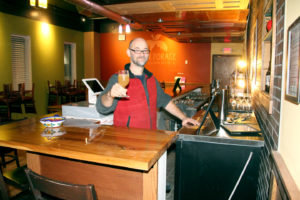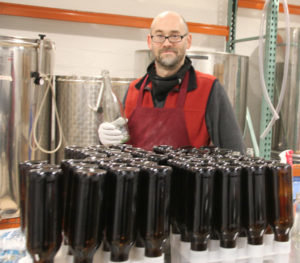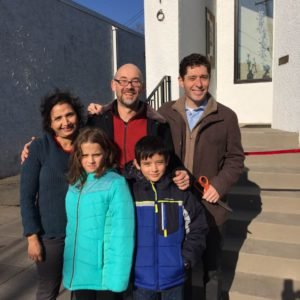By TESHA M. CHRISTENSEN
Just as he forages for the ingredients to make cider and wine, so Jeff Zeitler foraged for building materials to set apart the recently opened Urban Forage Winery and Cider House taproom (3016 E. Lake St.).
Above the bar hangs a collection of salvaged doors, while a decorative screen that graced the space in years past is on a wall. A long list of building materials came from the nearby Habitat for Humanity ReUse Store.
 Photo right: Drop by the recently opened Urban Forage Winery and Cider House to try one of four beverages on tap. The taproom is open Thursdays and Fridays from 4-10pm, and Saturdays from noon to 10pm. It is the city’s first winery since Prohibition. (Photo by Tesha M. Christensen)
Photo right: Drop by the recently opened Urban Forage Winery and Cider House to try one of four beverages on tap. The taproom is open Thursdays and Fridays from 4-10pm, and Saturdays from noon to 10pm. It is the city’s first winery since Prohibition. (Photo by Tesha M. Christensen)
Jeff was particularly delighted to open up a wall and find an old shelf made out of a packing crate, evidence from the past of another making something new out of what they had.
“We have a good product we believe in,” said Jeff’s wife, Gita Zeitler. “It’s local. We have no plans to be big, but we want to stay small and local and chemical free. We want to stay as unique as we are now.”
Unexpected surprises
Jeff made his first batch of hard cider while he was a college student at the University of Minnesota over 20 years ago. “I started out making wine when I was 19 to make alcohol, but I stayed with it because I like wine without sulfites,” Jeff remarked.
He had long dreamed of opening his own cider house, but it didn’t feel real until they purchased a foreclosed building along E. Lake St. five years ago. By renting out the main level, Jeff and Gita could help offset costs and make wine and cider in the basement. Soon after buying the building, Jeff was laid off from his job as a landscape architect for the first time, which left more time to devote to his dream job.
When he arrived at the building one day in January 2016 and discovered his tenants had abruptly moved out, and he was recently laid off again, Jeff realized it was time to go for it. He began the massive undertaking of remodeling the building to transform it into a taproom.
“I was basically unemployed and working at a non-profit for two years,” he said, adding that nothing would have been possible without his wife keeping them afloat financially.
While Jeff hired out the electrical, plumbing, heating and the elevator work, he did the rest himself, beginning with the demolition. Jeff adjusted the entire front of the building, adding large windows and a door for the elevator and removing the awning to make the building “pop.”
 Photo left: The fermenting and bottling operation takes up the basement of Urban Forage’s 100-year-old building at 3016 E. Lake St. Owner Jeff Zeitler makes wine throughout the year, although the harvesting is done spring through fall. (Photo by Tesha M. Christensen)
Photo left: The fermenting and bottling operation takes up the basement of Urban Forage’s 100-year-old building at 3016 E. Lake St. Owner Jeff Zeitler makes wine throughout the year, although the harvesting is done spring through fall. (Photo by Tesha M. Christensen)
“Before, there was nothing that really stood out on our block,” remarked Jeff. “You notice us now.”
When they first purchased the building, Jeff and Gita spend days tearing up the linoleum to reveal the maple hardwood underneath. In one spot was a large grease stain from when the space was used as a machine shop. Jeff sanded and sanded the messy area, and today he considers it the best spot on the floor.
“That’s what makes renovation fun to me—the unexpected surprises like that,” Jeff stated.
He does advise other new business owners to be patient and fearless. “Everything takes longer than you think it will take,” he observed. And it costs more, too. At one time, the Zeitlers found themselves unable to pay their workers on time as they waited for financing to kick in. “It’s very stressful,” said Jeff, “but now that it’s up and running it feels worth it.”
Would he want to do it again? “No way!” he answered.
They had been stymied for a time, thinking they needed a law change to operate an urban winery. But after hiring an attorney, they discovered there was still an old law from 1934 on the books that they could operate under.
When they opened the taproom in November, they became the city’s first winery since Prohibition.
They’re also the only cider house that makes real cider versus apple juice that has been mixed with a malt beverage.
Sophisticated tastes
In the transitional time between starting Urban Forage and opening the taproom, Jeff focused on figuring out what beverages people like best. When offered some gin botanicals (the spices that give gin its distinctive flavor) from Lawless Distillery, he created Gin Botanical on a lark, not sure whether it would be good or not. “That became a best seller,” remarked Jeff. “People love the Gin Botanical.”
The botanicals include juniper berries, coriander, black pepper and lavender along with other herbs. The unique beverage mixes gin and apple flavors to make something different, a spin on the classic gin and tonic.
 Photo right: In November, Minneapolis Mayor-elect Jacob Frey (far right) helped cut the ribbon during the grand opening celebration at Urban Forage. Also pictured, owners Gita and Jeff Zeitler with children Jaya and Akhil. (Photo submitted)
Photo right: In November, Minneapolis Mayor-elect Jacob Frey (far right) helped cut the ribbon during the grand opening celebration at Urban Forage. Also pictured, owners Gita and Jeff Zeitler with children Jaya and Akhil. (Photo submitted)
Given the nature of foraged fruit and natural yeasts, Jeff is never quite sure what flavors will come out of his stainless steel fermenters. One might be sour, while another is dull, and the third high in tannins. To achieve a good and consistent flavor, Jeff blends different batches.
“People say Minnesotans all want sweet wine. I don’t think that’s true—at least not in the Longfellow neighborhood,” observed Jeff.
“You have people with sophisticated tastes in Minneapolis.”
Jeff experiments with the foraged items he’s offered, including lilacs, dandelions, apricots, hops, mulberries, cherries, pears, apples and more—which allows him to create flavors you can’t find anywhere else.
For the first time this year, the Zeitlers didn’t have to go out and pick all the fruit they used, but instead, people brought them apples.
“We take the excess of the city and turn it into wine and cider,” Jeff stated.
Being sustainable is important to the Zeitlers. “I don’t want to leave the world worse than I found it,” explained Jeff. “We all have a responsibility to leave a light footprint.” Rather than purchase carbon offsets or ride a bicycle everywhere, Jeff focuses on something he can easily do.
“There a lot of fruit just going to waste on the ground. I want to use what’s all around us that no one is paying attention to,” he said.
Wild yeasts give distinct flavors
Jeff begins each batch by letting the wild yeasts ferment and start the process, which gives it the distinct flavor English and French ciders are known for. Then he adds a robust commercial yeast as needed to finish it off. He pasteurizes products to make them shelf-stable instead of dosing them with chemical additives. He avoids adding anything unless he needs to, using the Integrated Pest Management strategy of only adding sulfite if needed. He never uses potassium sorbate because he finds the taste disgusting.
Urban Forage can’t realistically obtain an organic designation because of the many places they get fruit from, but 98 percent of what they use hasn’t been fertilized, Jeff said. They’re just neighborhood trees that owners have been ignoring benignly.
That said, if he were given access to organic apples, he’d be happy to make a small batch of cider from just those apples and get an organic label for it.
Grateful for neighborhood
Jeff is grateful for the neighborhood’s support and noted that many of their customers come from Longfellow. “Thank you for supporting your local businesses,” said Jeff.
“We hope you come out and drink and make us improve all the time.”
He and a few other distillery owners are brainstorming ways to promote themselves and bring in more people to the neighborhood businesses, especially considering that they’re not located far from the light rail line.
The taproom is open on Thursdays and Fridays 4-10pm, and Saturdays noon to 10pm. Food trucks are frequently parked outside on the weekends. Dry cider and semisweet will always be on tap, and two other varieties will rotate in and out.
On the third Thursday of the month, drop by for Writer’s Open Mic night. On Mondays, Sara Milner holds Yoga classes; show up and pay $10 at the door for the one-hour class.
Up until March is the art show, “Fire and the Flame: Honoring 35 Years of Zorongo Flamenco,” by local artist and The League of Longfellow Artists (LoLa) founder Anita White.
Urban Forage products are also for sale at over 40 liquor stores in the Twin Cities area.
“This is the realization of a dream I didn’t think I’d ever actually realize,” said Jeff.
Comments
No comments on this item Please log in to comment by clicking here